Name that Brand!
07/09/14 20:28
After our recent reading and discussion about English in Japan, or Japanese English, Christian took the time to write out some very compelling thoughts and questions --
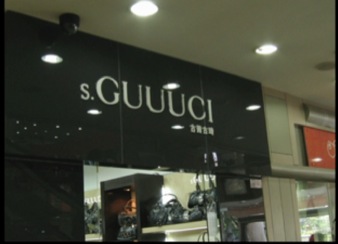
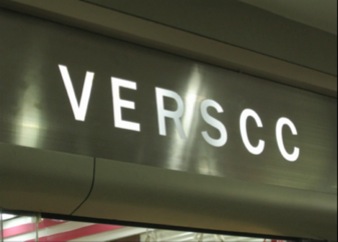
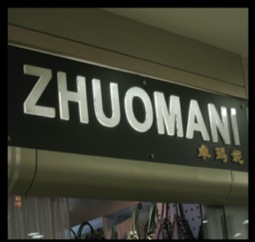
These humorous misspellings of well-known designer brands can be found in an unregulated marketplace in Guangzhou, China. The marketplace sells pirated imitations of brandname goods and uses these misspellings to avoid harassment from copyright.
From an insensitive western perspective these signs express Chinese submission to Italian brandnames, or to generalize more, Asian submission to Western innovation in business. When my class watched this TED Talk last year we thought it was hilarious that a Chinese black marketplace would adopt such imitations.
Reading the article about Japanese English reminded me of these articles, especially the concept that a borrowed word could have more modern connotations in Japan. This has brought me around to the pretty obvious conclusion that even if these businesses are not legitimate, rallying around known brands gives them draw, lets them create associations that can potentially change consumer apprehensions from negative to positive. It’s not content that matters, just the first impression.
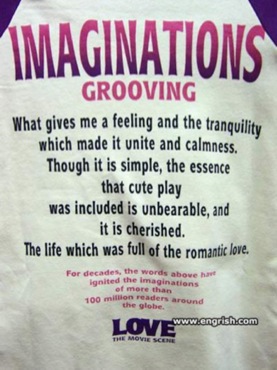
Look at this shirt. It’s not fully comprehensible…but consider the tone set by the key words “Imaginations” and “Grooving.” Both of these words have a peaceful, optimistic quality about them. Plus the cool pink and purple makes the shirt easy on the eyes and matches the romance that the words allude to. The brand created by the presentation of the key words establishes a feeling of peacefulness and warmth.
Here’s something more. Native English speakers frequently wear shirts with broken English language on them. We let wearers of these shirts off the hook though...I’m referring to shirts advertising for bands or in particular albums. For example Blood Sugar Sex Magik by the Red Hot Chili Peppers is broken English, misspelled English. We excuse this because Blood Sugar Sex Magik is a title. But what do titles actually do? They set the tone of a work, they’re their own sort of brand. I don’t have a massive conclusion to draw from this, but if we recognize the right of native speakers to toy with a language then why shouldn’t non-native speakers be provided with the same right to make brands out of the language. Why be so elitist?
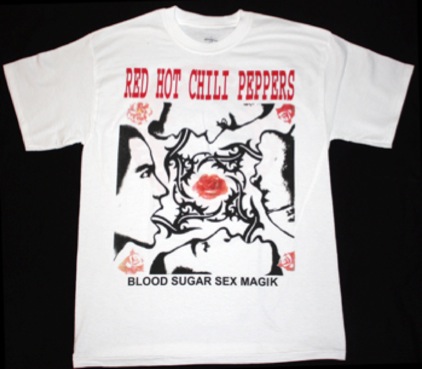



These humorous misspellings of well-known designer brands can be found in an unregulated marketplace in Guangzhou, China. The marketplace sells pirated imitations of brandname goods and uses these misspellings to avoid harassment from copyright.
From an insensitive western perspective these signs express Chinese submission to Italian brandnames, or to generalize more, Asian submission to Western innovation in business. When my class watched this TED Talk last year we thought it was hilarious that a Chinese black marketplace would adopt such imitations.
Reading the article about Japanese English reminded me of these articles, especially the concept that a borrowed word could have more modern connotations in Japan. This has brought me around to the pretty obvious conclusion that even if these businesses are not legitimate, rallying around known brands gives them draw, lets them create associations that can potentially change consumer apprehensions from negative to positive. It’s not content that matters, just the first impression.

Look at this shirt. It’s not fully comprehensible…but consider the tone set by the key words “Imaginations” and “Grooving.” Both of these words have a peaceful, optimistic quality about them. Plus the cool pink and purple makes the shirt easy on the eyes and matches the romance that the words allude to. The brand created by the presentation of the key words establishes a feeling of peacefulness and warmth.
Here’s something more. Native English speakers frequently wear shirts with broken English language on them. We let wearers of these shirts off the hook though...I’m referring to shirts advertising for bands or in particular albums. For example Blood Sugar Sex Magik by the Red Hot Chili Peppers is broken English, misspelled English. We excuse this because Blood Sugar Sex Magik is a title. But what do titles actually do? They set the tone of a work, they’re their own sort of brand. I don’t have a massive conclusion to draw from this, but if we recognize the right of native speakers to toy with a language then why shouldn’t non-native speakers be provided with the same right to make brands out of the language. Why be so elitist?


